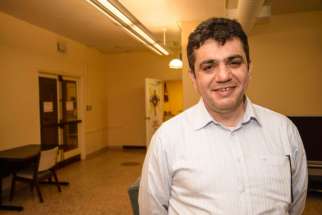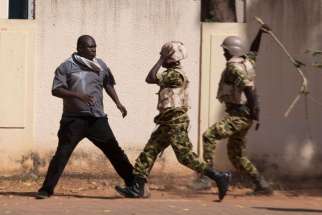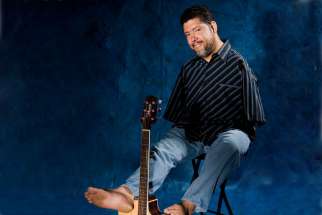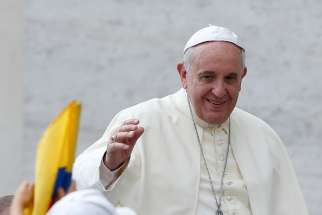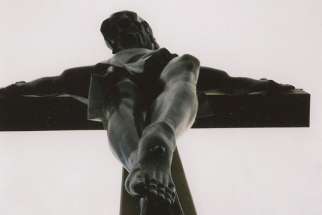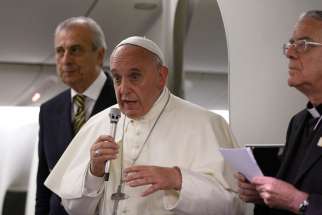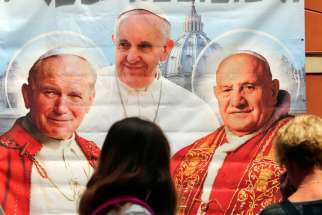Christians maintain hope in Syria’s bleakness
TORONTO - It’s not easy being Syrian, especially if you’re the forgotten minority caught in the tsunami of sectarian massacres and ethnic cleansing referred to as the Syrian civil war.
Burkina Faso bishops urge return of civilian rule
OXFORD, England - Burkina Faso's Catholic bishops sent a "message of peace and hope" to the West African country after its 27-year president, Blaise Compaore, fled prompting a military takeover.
Melendez strums a message of hope
TORONTO - Armless guitarist Tony Melendez wants audiences to walk away from his performances with hope.
VATICAN CITY - Today's bishops must be as vigilant and courageous as sentinels keeping watch over the faith, and as forgiving and patient as Moses, leading a sinning people across harsh deserts to God, Pope Francis said.
Faith and hope can help renew our relationship with God
The sawed-off four-metre wooden crucifix was carefully lowered to the ground at the entrance to the cemetery.
Pope's Holy Land trip raises hopes, questions
VATICAN CITY - Given the Holy Land's long and complex history of military, religious and cultural conflict, the run-up to Pope Francis' May 24-26 pilgrimage was inevitably marked by fears it would be marred by controversy — or worse.
VATICAN CITY - Just days before Pope Francis was set to canonize two of his predecessors, he expressed his hopes the two soon-to-be saints would continue to inspire the whole church in its mission.
Hope and optimism
Pope Francis is the first pope from Latin America and he ensured South America was the destination for his first foreign trip. So it was no surprise that the Argentine Pope was welcomed to World Youth Day in Brazil by huge, adoring crowds who brought his motorcade to a standstill.
Emissary of hope
As war raged in Syria and an anti-Muslim film ignited violence across the Arab world, Pope Benedict calmly arrived last week in Lebanon as a “pilgrim of peace.”
The 85-year-old pontiff would have been excused if, citing age and security concerns, he’d postponed this trip. During his three-day stay, 25 people were injured and a man killed in Lebanon’s second largest city, Tripoli, during protests aimed at an American film that mocks Islam. The day after he left, missiles from Syrian jets hit Lebanese territory. The region, habitually unsafe, is particularly dangerous right now.
The purpose of the trip was to officially endorse the Apostolic Exhortation that was drafted following the 2010 Synod of Bishops for the Middle East. That task could have been accomplished in the Vatican, of course, and transmitted live worldwide by video-conferencing and Internet technology. Yet the Pope dismissed that option.
Instead, he made the right and courageous decision to stand beside the Christians of the region and, by his physical presence, acknowledge the hardships they endure by living in nations that are often hostile to Christianity. That simple act alone says much about the Pope. Then, addressing some 20,000 young people from several Middle East countries, he urged them to be the vanguard to keep Christianity alive in the lands of its birth.
Middle East Christians, facing social and economic discrimination and seeking safety for their families, have been emigrating in droves to Europe and North America. At the current pace, Christianity might virtually disappear from the region in a generation. It is asking much of young Christians to endure financial and religious hardship, but that is exactly what the Pope implored. To be effective, the message had to be delivered in person.
“I am aware of the difficulties you face daily, on account of instability and a lack of security, and your sense of being alone and on the margins,” he said. But, he added, “You are meant to be protagonists of your country’s future.”
The Pope’s Apostolic Exhortation lays a common-sense framework for Middle East Christianity to endure. It emphasizes dialogue, respect, equality, tolerance and forgiveness among Christians, Muslims and Jews, while denouncing secularism and fundamentalism. The Pope urged young people to never be afraid or ashamed of being Christian and he affirmed their right to religious liberty, to live publicly as Christians and to participate fully in civil life.
The Pope arrived in Lebanon as a pilgrim of peace but departed as an emissary of inspiration and hope. He ignored the latest regional upheaval and chose boldly to stand among the anxious Christians to let them know in person that he will not abandon them. That may have been the most important message of all.
Pope Benedict's visit can bring new hope to Middle East
As war bears down from all sides, Lebanese Christians are waiting for their own Arab Spring. For the Middle East’s most Christian country, spring arrives with Pope Benedict’s visit to Beirut Sept. 14-16.
“The Pope’s visit comes as an important message of peace, not only for the Christians but also for the Muslims of the region,” Issam Bishara, Catholic Near East Welfare Association regional director, told The Catholic Register in an e-mail from Beirut.
With much larger Syria fully engulfed in civil and sectarian war to the north, east and south, fighting has already slipped across the border into Lebanon.
“Lebanon cannot but be affected by what is going on in Syria,” Bishara said.
Despite the raging war in Syria, Lebanese and Vatican officials expect the papal visit to proceed on schedule.
“I know that the visit is very well prepared and the security is under the control of the presidential guard,” said Bishara.
In Beirut on Sept. 15, Pope Benedict XVI will deliver an exhortation based on the 2010 Synod on the Middle East in Rome. The synod gathered bishops and patriarchs of the region with selected bishops from around the world to discuss the future of Christianity in the land of its birth. With a diminishing Christian population, deep divisions along religious lines and the increasing dominance of politicized forms of Islam, the bishops called for an enlarged secularism with room for all religious voices and institutions to contribute to society. Such a transformation has to begin with ideals of citizenship which transcend local allegiances of tribe, clan and family, said the bishops.
Keeping Lebanon at peace is critical for the future of the whole region, said Fr. Youssef Chedid, associate pastor at Toronto’s Our Lady of Lebanon parish.
“Lebanon is a key country in the (Middle) East in which everything that happens in Lebanon will have implications for the whole area, and vice versa,” he said.
Chedid was an expert advisor at the 2010 Synod on the Middle East. He views the Pope’s Sept. 15 exhortation as an opportunity to re-orient the Arab Spring.
“It’s more an autumn than a spring (so far),” said Chedid. “It hasn’t brought good news. It hasn’t brought events of social progress. It didn’t get better after all these revolutions.”
Pope Benedict XVI’s exhortation is an opportunity to change the channel on entrenched regional conflicts, said Chedid.
“We would hope that this exhortation will bring to the whole Middle East a new hope,” he said.
A form of secularism that respects and values the contributions of all religions, where majorities and minorities can speak as equals, is the best hope for Middle Eastern Christians, said Chedid.
“We don’t want to be considered second rate. We don’t want to live in a totalitarian regime. We want democracy that will care for all the social groups,” he said.
Chedid grew up in Lebanon under the rule of the militias. He worries that importing a war from Syria repeats the same mistake of Lebanon in the 1980s.
“It’s the war of outside parties with everyone supporting outside parties,” he said. “They’re doing their fight on our land.”
Countering the tendency for regional wars to seep into Lebanon, the Pope has the opportunity to export a vision of peace from Lebanon to the region, according to Chedid.
“Our hope after the visit of the Pope to Lebanon is that through Lebanon he will speak to all the Arab countries and he will help us to understand each other — to help us to have a good dialogue, not between the strong party and the weak party but between all of us as believers. We will have a dialogue that will care about everything on the social level and also the political level.”
This message matters when gun battles break out between Sunni and Alawite militants across Syria Street in Tripoli, Lebanon’s second largest city, said Bishara. The Alawites are loyal to the Assad family and its regime in Damascus. As in Syria, the Sunnis line up with rebel forces.
It isn’t just Lebanon’s Muslims who are picking sides in Syria’s war.
“Christians in Lebanon have already chosen sides. One group supports General (Michel) Aoun (founder of the Free Lebanon Party) whose allies are the Shiite Hezbollah and Speaker of the House Nabih Berri,” said Bishara. “Another Christian group is loyal to the chief of the Lebanese Forces Samir Geagea, supported by the Sunnite political leaders headed by the previous Prime Minister Saad Al-Hariri.”
Aoun’s group is part of the March 8 Movement allied with Syria. Hariri is leader of the March 14 Alliance which opposes Syrian interference in Lebanon.
“The Church leadership in Lebanon, especially Maronite Patriarch Bechara Boutros al-Rahi, has been trying to unify this schism for years — but with very little success,” said Bishara.
So far, all parties want to avoid the kind of militia-led politics that made Lebanon a failed state in the 1980s.
“Going back to the years of war when militias were in charge of Lebanon is very unlikely,” said Bishara. “The leadership of the different political groups have all experienced the devastation resulting from total loss of order by government and also know well that in the end they will all lose.”
Al-Rahi condemned the “so-called military councils of clans and sects” as fighting broke out in Tripoli. Al-Rahi is calling on Lebanon’s central government to exercise full control and maintain its independence.


